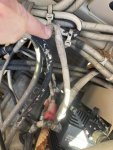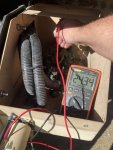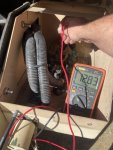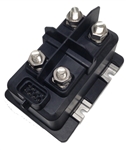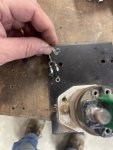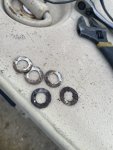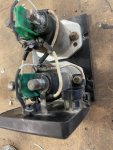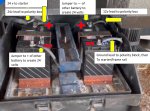Wingnut13
Well-known member
- 235
- 564
- 93
- Location
- Strafford, NH
Well yesterday was a nice day, went for a ride. Parked the truck last night. Worked on routing electrical wires for the Boss snow plow …. But hooked up NOTHING…. Had everything in place and was ready to make a beer run. I turned the power switch on and Voltage showed low, 22-24VDC, huh, I didn’t leave the lights on overnight or anything dumb as far as I can tell.
I tried to start the truck and the starter clunked a couple times, then everything went dark, just like when a capacitor dies…… slowly, not just everything shuts off instantly. Oh boy.
I found nothing out of sorts initially but then found 12vdc on the alternator 24v side, 0vdc on the 12v side. Huh. I then expertly smacked the side of the battery shutoff box, power came on! Ok, open the box and check out connections. I found some extremely corroded connections. Spent the better part of 2 hours cleaning and replacing wrong sized washers etc.
After all this I hooked the battery’s back up and verified voltage in and out of the battery disconnect box. Everything looked good there. However up at the LBCD I’m only showing 12v on the 24v side and 0v on the 12v side…..
Tomorrow I’ll fix up those connections. But I’m the meantime, the Alt still has 12v on the 24v side and 0v on the 12v side.
Anyone have any ideas?
I tried to start the truck and the starter clunked a couple times, then everything went dark, just like when a capacitor dies…… slowly, not just everything shuts off instantly. Oh boy.
I found nothing out of sorts initially but then found 12vdc on the alternator 24v side, 0vdc on the 12v side. Huh. I then expertly smacked the side of the battery shutoff box, power came on! Ok, open the box and check out connections. I found some extremely corroded connections. Spent the better part of 2 hours cleaning and replacing wrong sized washers etc.
After all this I hooked the battery’s back up and verified voltage in and out of the battery disconnect box. Everything looked good there. However up at the LBCD I’m only showing 12v on the 24v side and 0v on the 12v side…..
Tomorrow I’ll fix up those connections. But I’m the meantime, the Alt still has 12v on the 24v side and 0v on the 12v side.
Anyone have any ideas?


